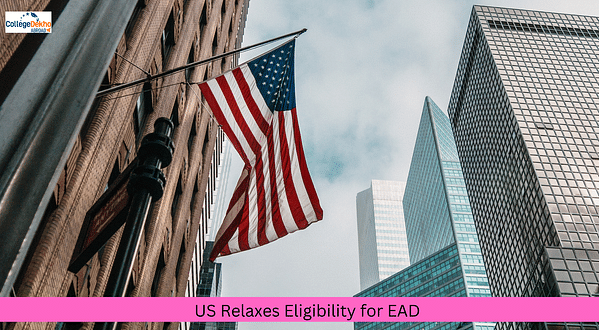The United States has recently announced changes to the eligibility criteria for initial and renewal applications of Employment Authorization Documents (EADs) in compelling circumstances. EADs serve as proof that individuals are authorised to work in the US.
This development brings relief to immigrants who find themselves caught between ongoing layoffs and long visa backlogs. These documents are granted to certain nonimmigrants who are beneficiaries of approved employment-based immigrant visa petitions, as well as their qualifying spouse and children.
They are designed to assist individuals facing expanding backlogs for immigrant visas and experiencing compelling circumstances, allowing them to continue working and residing in the US.
The new policy particularly benefits Indian immigrants living in the US, as many of them face a backlog of over 100 years for EB-2/3 green cards.
Also Read: US F1 Visa Appointment Dates to be Announced Soon for Indian Students, says Embassy
In the event of job loss, individuals have only 60 days to find new employment or risk being forced to leave the country, despite having lived there for more than a decade and having established a life.
The revised immigration rules offer significant advantages to Indian professionals working in the US under H-1B or L-1 nonimmigrant visas. According to the updated provisions issued by the U.S. Citizenship and Immigration Services (USCIS), these individuals may now apply for EADs under compelling circumstances, such as serious illness and disability, employer disputes or retaliation, substantial harm to the applicant or significant disruption to the employer.
The policy emphasises that individuals with a valid EAD based on compelling circumstances will not accumulate unlawful presence, safeguarding them from abrupt interruptions in their journey towards obtaining permanent residency.
To be eligible for an initial EAD based on compelling circumstances, applicants must meet specific criteria, including being the principal beneficiary of an approved Form I-140 immigrant petition for alien workers in the 1st, 2nd or 3rd employment-based preference category. They must also be in a valid nonimmigrant status or authorised grace period under specific visa categories, not have filed an adjustment of status application and demonstrate compelling circumstances that justify the issuance of employment authorization.
Individuals who receive a compelling circumstances EAD and begin working based on this document will be in a period of authorised stay but will no longer maintain their nonimmigrant status. However, they generally will not accumulate unlawful presence in the United States. At the same time, the EAD is valid or while their application is pending, provided they have filed a non-frivolous application on time.
To apply for an initial grant of employment authorization under category (c)(35) or (c)(36), individuals must submit Form I-765, Application for Employment Authorization and obtain an EAD from the USCIS before commencing work under this authorization.
Renewal of employment authorization is possible in one-year increments under certain conditions. For the principal beneficiaries of an approved Form I-140, the renewal application must be filed before the current EAD expires, and they must meet specific requirements related to immigrant visa availability and priority dates. Dependents can also renew their EADs by filing the renewal application before the current EAD expires and providing evidence of the principal beneficiary's approved renewal application, as well as a continuing relationship with the principal beneficiary.
These measures have been praised by Ajay Bhutoria, a prominent community leader and advocate for immigrant rights, who considers them a significant step toward supporting individuals facing challenging situations and ensuring their lawful employment in the United States. Bhutoria emphasizes the importance of these measures for individuals and their dependents who encounter serious illness or disability, employer disputes or retaliation, substantial harm or disruptions to their employment.
Also Read: Columbia University Refuses to Participate in U.S. News & World Report Undergrad Rankings 2023
He also highlights that the list of qualifying circumstances provided by USCIS is not exhaustive, allowing individuals to present evidence that supports their case. For example, individuals with approved immigrant visa petitions in oversubscribed categories or chargeability areas can submit evidence such as school or higher education enrollment records, mortgage records or long-term lease records to demonstrate compelling circumstances.
Need Expert Help in US Study Visa Interview Tips?
Source: Economic Times, Hindustan Times, The Hindu

























